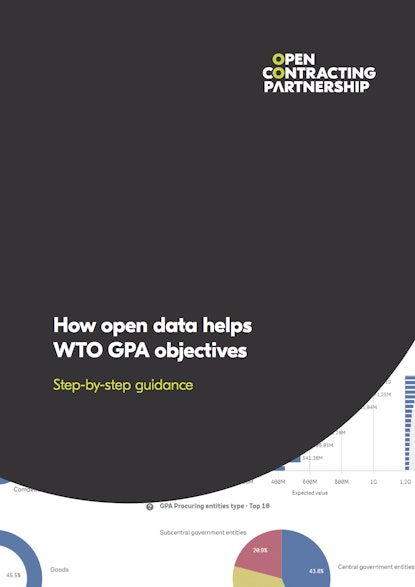New guidance on open contracting & trade

The World Trade Organization (WTO) may be facing its fair share of criticism at the moment but its Government Procurement Agreement (GPA) is a crucial piece of international law between over 50 countries to open up and ensure mutual, fair access to their procurement markets. The success of the Agreement largely depends on the encouraging cross-border competition that should lead to better prices and quality of goods, services, and works for citizens.
So can we tell if it is working?
I’ve personally attended several of the GPA’s meetings at the stunning WTO headquarters on the shores of Lake Geneva over the last few years. Everybody at these events agrees that good data is central to good procurement performance, but almost no one agrees on unified approaches to publish and share that information to boost GPA objectives. Incredibly, the community can hardly assess the levels of cross-border procurement between their countries because they struggle with data collection and analysis.
The new guidance that we’ve just published explores exactly this issue. We think that an open contracting approach — and crucially the use of standardized open data — should not only increase the visibility of cross-border opportunities but also measure their impact.
Our guidance shows how collecting and publishing standardized open public procurement data, and tracking useful metrics, can improve procurement performance, including cross-border participation. This approach can also help boost market access. Multiple studies show that transparency and competition are very closely correlated (see some of the latest research on this here).
With the help of our smart colleagues at both the European Bank for Reconstruction and Development (EBRD) and the WTO GPA (with a special nod to Eliza Niewiadomska and Dmitry Palamarchyuk at the EBRD who first put us onto this topic), we realized that implementing the Open Contracting Data Standard can be transformative in how countries perform under the GPA Agreement. So we compiled new guidance to make the case to GPA member states.
I want to emphasize that implementing OCDS satisfies and goes beyond the GPA publication requirements in our experience. Also, rather than a huge year-end bureaucratic exercise in compliance reports, members can have a live statistical dashboard that can substitute regular reporting to the GPA Secretariat (as allowed under Article 16 of the GPA). This would save governments a lot of time and money.
Open contracting champion Ukraine already does this.
I’m also convinced that, by making the open contracting approach useful for government reporting, GPA members will understand just how important it is to collect good data and share it with their stakeholders more generally to drive improvements in all their contracting processes.
I hope that with our guidance, governments can go beyond statements like “data is important” and do a better job of creating a transparent environment in which companies feel welcome to participate.
So have a read and if you want to talk about this piece or any other aspect of our work, drop me a line at kgranickas@open-contracting.org.
And, if it’s of interest, you can read more on the background of our work with the GPA here.